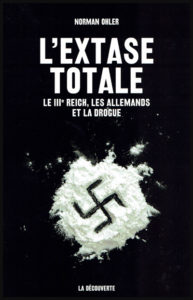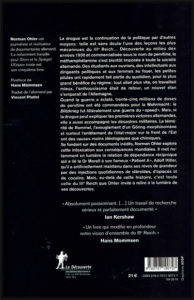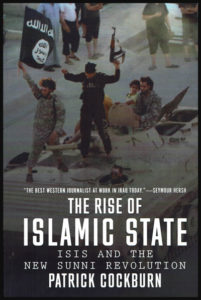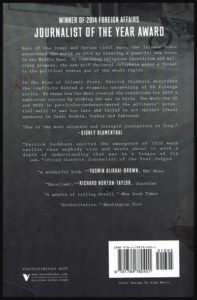Translated from German to French, this book is titled : « L’extase totale – Le troisième Reich, les Allemands et la drogue ». The original title was : « Der totale Rausch. Drogen im Dritten Reich ». The author is a German journalist and documentarist who worked for Stern and Der Spiegel. He has also written four other books. I tried to translate the quotes to the best of my ability.
The research made by the author shows that in the years preceding the Second World War, the German population regularly used drugs to better support the defeat resulting of the First World War. Drug consumption was a standard phenomenon. It became necessary to curtail this habit.
Hitler is thus presented as a « pure role model […], an ascetic, the enemy of drugs who disregards his own needs » (p.25). But if there is somebody in Germany who is becoming a regular user of drugs and who even has access to his own pusher, namely the well-known Dr Morell, it is Hitler.
In the documents presented by the author, Hitler is also described as the Patient A : « Hitler is getting used to repetitive shots and to those mysterious substances flowing in his veins to supposedly invigorate him » (p.37).
In 1937, the Temmler factories create the first German methylamphetamine, also known as « pervitin ». There is a widespread use in the German population as well as in the army. Pervitin is the artificial booster that lasts more than twelve hours, « solves problems » and keeps the German soldier awake for several days : « Use of pervitin becomes as natural as drinking a cup of coffee » (p.44).
The German troops, who sleep every two or three days now, rush through Europe. It is the famous Blitzkrieg. The armour do not stop anymore. While the Allied soldiers must sleep on a rotating basis, the German soldiers charge without taking any breaks, energized with methamphetamine.
Poland is the first surprised. « […] provided with a huge amount of drugs, but without dosage indications, the Wehrmacht attacks the Polish neighbour who is not doped and has no idea of what to expect. » (p.63).
Thirty five million doses are ordered for the army and the Luftwaffe. « The Wehrmacht becomes the first army in the world to widely use chemical drugs […]. A new form of war has appeared » . (p.76)
Peter Steinkamp, a medical historian, states that « the Blitzkrieg was led through the use of methamphetamine, not to say that it was planned with methamphetamine in mind » (p.85).
The German officers do not obey orders anymore, exhilarated by the quick victories : « Guderian […] continues his offensive while he has formally received the order to stop » (p.86). It is the same thing for Rommel who does not obey General Hoth’s orders : « He has lost all senses of danger, [which is] a typical symptom of an excessive consumption of methamphetamine. He maintains his offensive both day and night ». (p.88). Hitler does not control the generals of the armoured divisions who now act in an autonomous mode.
Decided to regain control of his officers, Hitler takes a decision that ignores any military strategy. He orders all his troops to stop during ten days, at a moment when they have almost surrounded the Allied. The German officers impress upon Hitler to complete the military campaign but « Hitler wants to show his ground troops that it is him and nobody else who leads this war » (p.95). At Dunkirk, « more than 340,000 French, Belgian and British soldiers escaped by the sea » (p.95).
The author refers to numerous research documents pertaining to extensive drug consumption among soldiers and officers. This habit was present up to the highest military ranks. The German population was also keen to use drugs on an extensive basis : « It does not take long before the number of doses that find themselves in the stomach or blood of Germans exceed the million doses » (p.114)
The melting pot of drugs used on a daily basis by Hitler has an important effect on his judgment. He makes a serious strategic mistake concerning the war raging with Russia. He forbids any retreat of the German troops without his official authorization. The Wehrmacht undergoes heavy losses to the elite Russian divisions « freshly arrived from Siberia » (p.135).
Another important strategic mistake happens in December 1941 when Germany decides to declare war to the United States : « Germany is already exhausted by the fights it wages on multiple fronts, while overseas, the industrial giant is ready for the battle » (p.139).
Hitler’s stubbornness « to refuse to give up an inch of the conquered territory has a more profound reason : that the chimneys continue to work as long as possible in the East, in the extermination camps in Auschwitz, Treblinka, Sobidor, Chelmno, Majdanek and Belzec. Hold all positions until all the Jews are killed. Distancing himself from the human laws, [Hitler] continues his war against the weakest» (p.140).
The author enumerates other military strategical mistakes made by Hitler. He also details the close relation that existed between Hitler and his personal doctor, Dr Morell. The reader learns about the content of Hitler’s daily drug cocktails, among which Eucodal, cocaine and morphine. Benefiting from his close personal relation with Patient A, Dr Morell also increases his personal influence and fortune.
The reader witnesses the Führer’s progressive decline and the consequences of his desperate decisions. It is quite surprising that among all Hitler biographies, his heavy consumption of drugs and their consequences are barely noted.
The end of the book deals with the harsh experiments made on prisoners in the concentration camps.
The book « L’extase totale » allows a different understanding of the Second World War and of the psychology of the German population at the time. The reader realizes the very strong impact of the chemical drugs before and during the war. Even the way the Blitzkrieg is traditionnally presented has to be reviewed.
The advanced technology combined with military strategy and extensive use of chemical drugs initially gave the advantage to the German forces. However, with time, a lack of control on pervitin and other drugs had irreversible negative consequences on a huge number of soldiers and officers. It was the cause of crucial military strategical mistakes. An exclusive identity-based nationalism was also responsible for the loss of millions of human lives.
Click on the link for more controversial subjects on my blog.
Title : L’extase totale – Le troisième Reich, les Allemands et la drogue
Author : Normand Ohler
Editions : La découverte
© 2016
ISBN : 978-2-7071-9072-7




